SOA Tanzania through our Grass Underwater Project we aim at adopting seagrass meadows in Tanzania for protection, conservation, and restoration. in 2023 we adopted a total area of 0.5sqKm of seagrass meadow in Tanzania for monitoring and restoration. This project was done by our ocean leaders and our local coastal community members in Bagamoyo,Tanzania. We asked our ocean leader and heroes to 0.5Kmsq of seagrass meadows in Tanzania about their experience on seagrass restoration and their takeaways and here is what they had shared…!
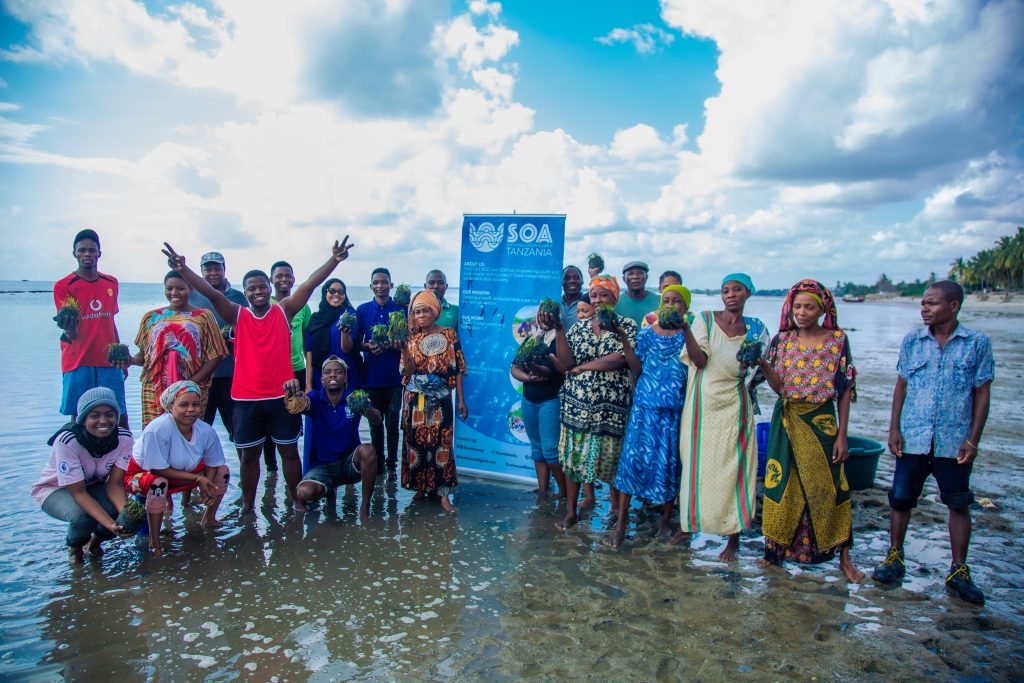
Qn1: WHO ARE THEY…..?
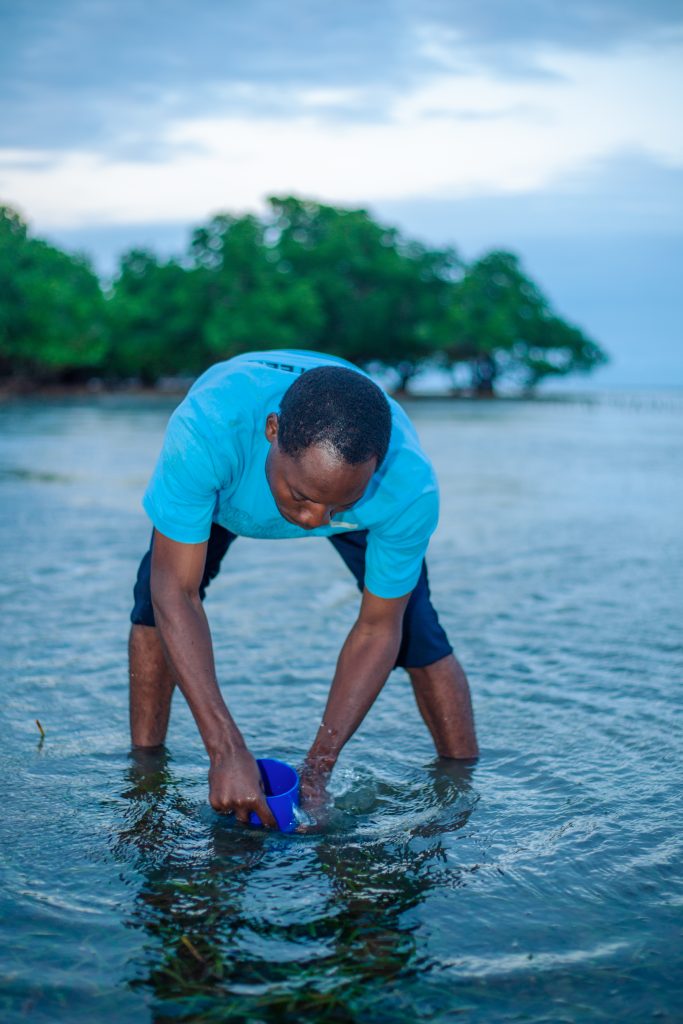
MADEREKE JOHN from Dar es Salaam. A Tanzanian Youth with 25 years old. Got his Primary and Ordinary Secondary Schools within Mara region.
Studied his Advanced Secondary at Tunduma District, the Higher Education attained from College of African Wildlife Management and Sokoine University of Agriculture from 2019 to 2022.
He has a Bachelor Degree of Science in Wildlife Management from the institutions mentioned above respectively. He is very interested in all issues concerning Marine, Wildlife, Environmental conservation, Community and Climate Action.
He won awards from Grumeti Fund as an Environmental Ambassador, he has worked with WISASUA as a Secretary and recently working as an Ocean Leader at Sustainable Oceans Alliance Tanzania.
Doreen Walter, a marine scientist with a professional background in Marine science. Graduated from the University of Dar es Salaam, Tanzania.
Currently, she is an ocean Leader at Sustainable Ocean Alliance Tanzania. Her passion lies in the realms of ocean conservation and restoration.
Her ultimate career objective is to contribute to the restoration of ocean health and long-term sustainability.
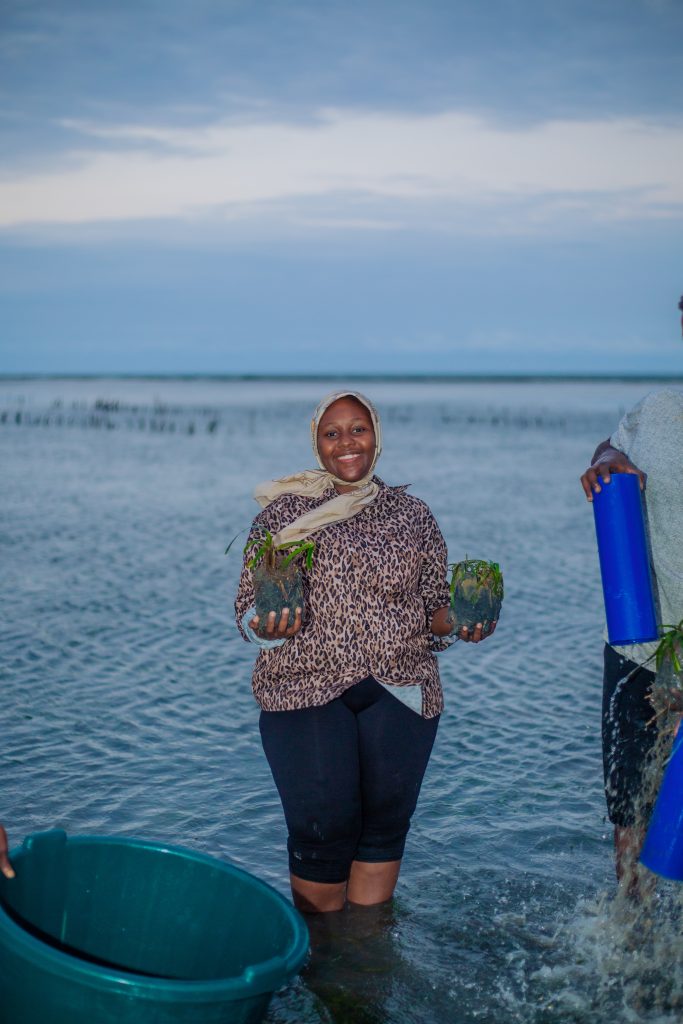
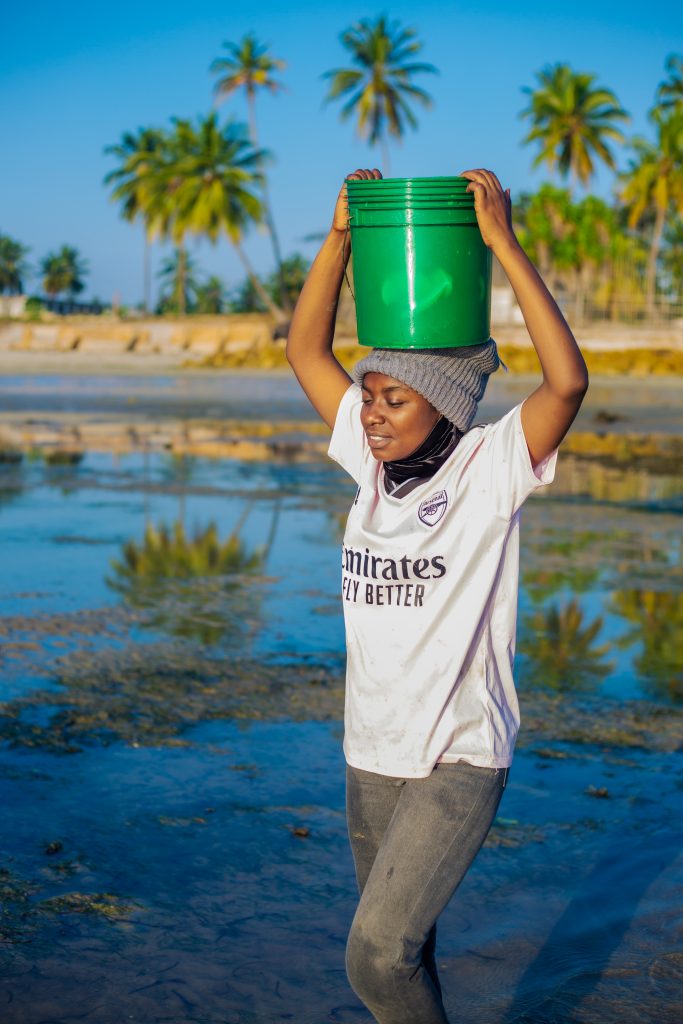
Hadija Mussa, a recent graduate from Sokoine University of Agriculture, where she earned a Bachelor of Science in Environmental Sciences and Management.
She is actively involved with the Sustainable Ocean Alliance Tanzania, where her mission is to contribute to the conservation of our oceans for both our present and future generations.
Shadya Amanullah Ngirini. I am a marine scientist with a Bachelor degree in Marine sciences, currently I am pursuing my masters in marine science and I am directing my career towards Marine social sciences. I am also the community manager at SOA-Tanzania and a tutorial assistant at University of Dar es Salaam, Institute of marine Sciences.
I believe that marine resource management is a critical issue and we somehow need to attain sustainability. To achieve this we need all three pillars of sustainability these are; environmental dimension, social dimension and economic dimension at a balance. To contribute in this race to attain sustainability is why I have directed myself career-wise towards social sciences because I believe unlike the other dimensions have been researched more but when it comes to the social part there still are so many questions that need answers and I wouldn’t want to miss out in the quest for finding these answers.
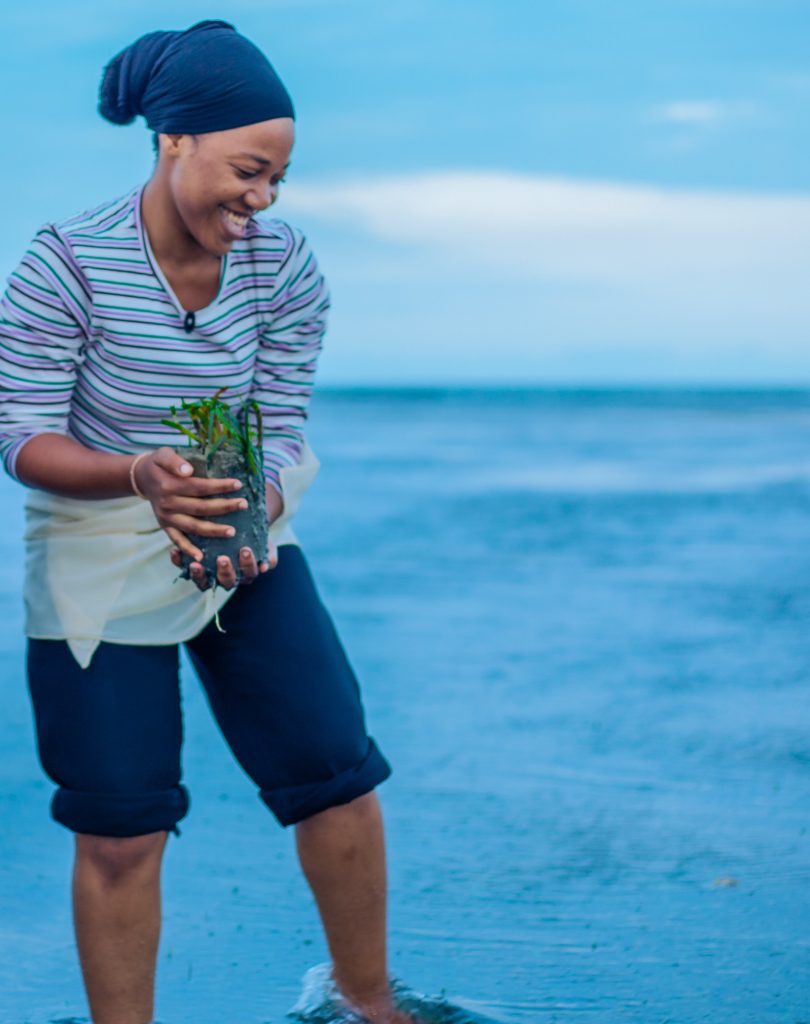
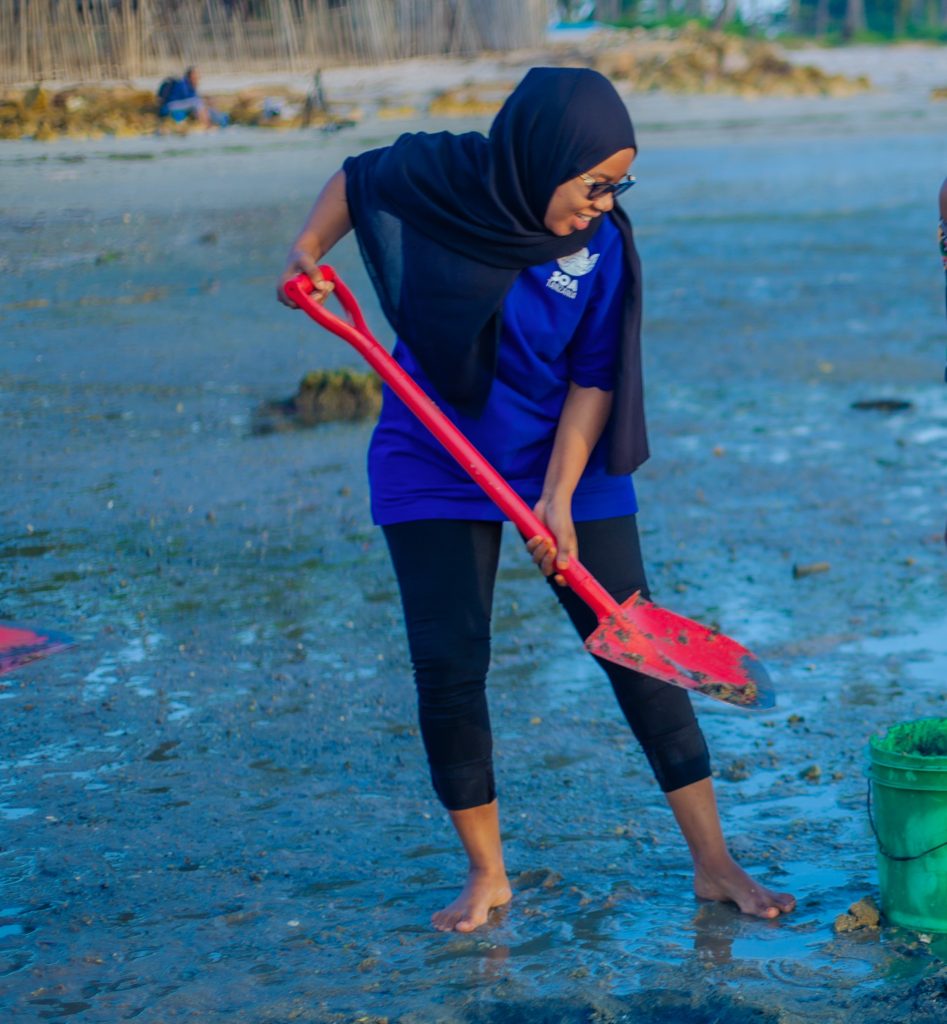
My name is Nasra Nurdin. I have studied and completed my primary level education at Olympio primary school. I have studied ordinary level education at Jangwani secondary school taking science subjects as the most preferred subjects., I have also studied advanced level education at Benjamin William Mkapa high school taking specifically Biology, Chemistry and Physics subjects.
I have completed my bachelor degree in University of Dar es salaam taking bachelor degree of aquatic sciences and fisheries technology. I have gained experience by working with Sustainable ocean alliance as an ocean leader and also working with Righa’s Safinas fish company for three months as a hatchery assistance manager.
I am Amrani Nurudini, is a Blue economy officer and a co-founder of SOA Tanzania, He is an Aquaculture and aquatic scientist honored Bachelor of science in Aquaculture and aquatic sciences form the University of Dodoma, Tanzania.He is a young Ocean leader at sustainable ocean alliance Tanzania since 2020,who serving marine conservation projects like seagrass underwater,Miko yetu( our mangroves) project, sustainable fish farming and fisheries and combating marine pollution to make our ocean and other aquatic ecosystems healthy and sustainable.He is passionate about serving ocean ecosystems and he believe that together we can make our planet’s ecosystem abundant again.
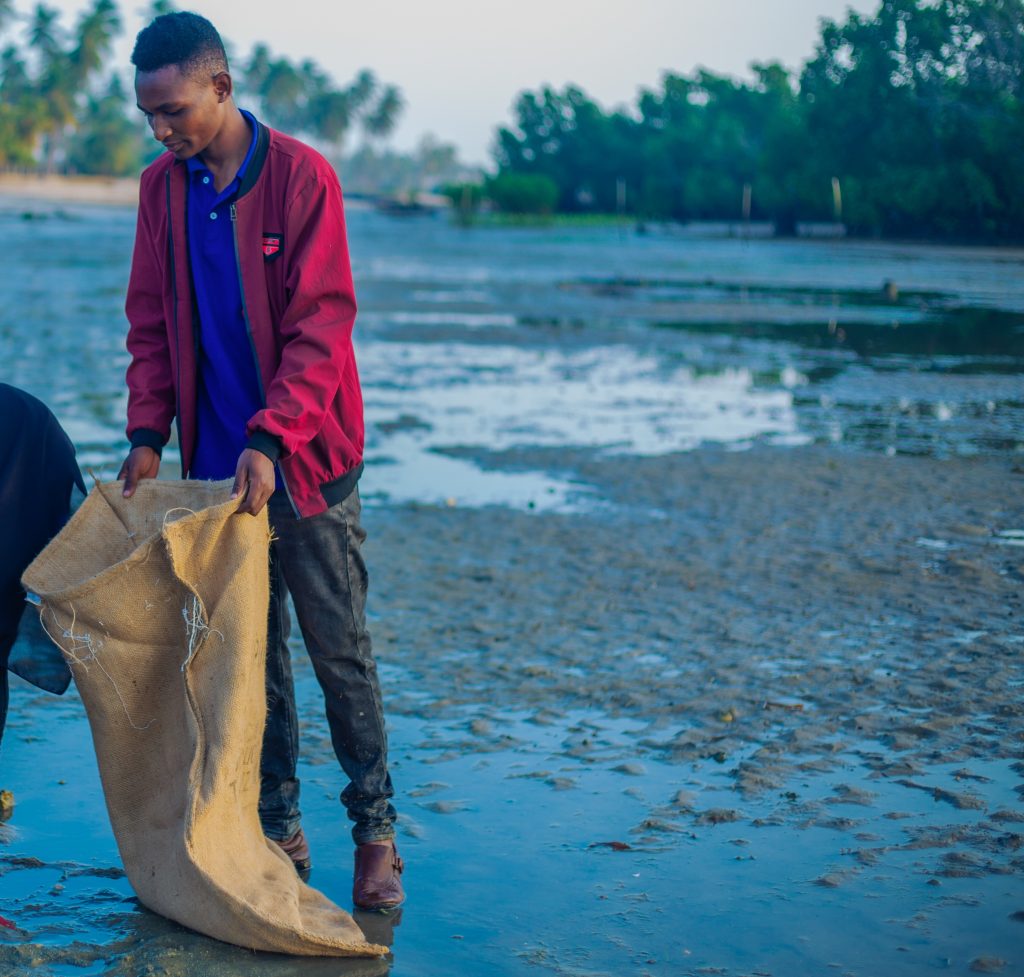
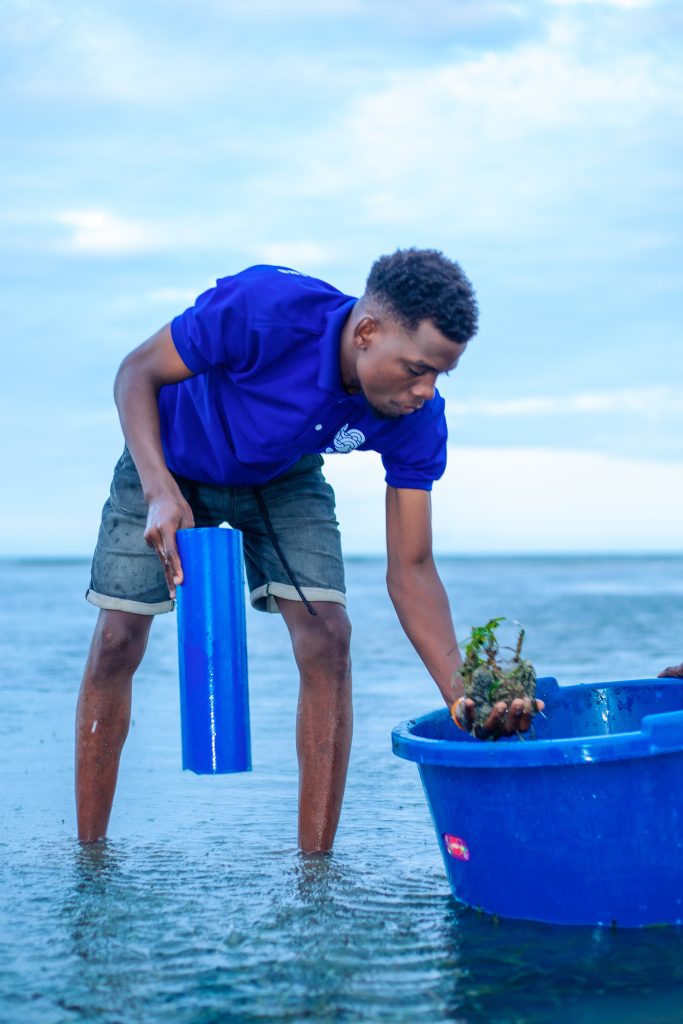
Paul Matonya is an early carrier marine scientist who have devoted his career towards ocean conservation and environmental conservation and protection in general. He graduated at the University of Dar es salaam pursuing Bachelor of Aquatic Science and Fisheries Technology.
He is Co founder and young ocean leader of Sustainable Oceans Alliances Tanzania (SOA Tanzania). He is experienced in Marine Conservation and Aquatic pollution. He has been a part of changes participating in conservational projects like Mangroves restoration, Seagrass restoration marine litter survey and monitoring and been able to empower youths in Tanzania to take part in natural based solutions.
I am Renatus Martin Shigi a graduate from Sokoine University of Agriculture pursuing Bachelor of science in Aquaculture, currently I’m taking my second degree on Science in fisheries and Aquaculture at University of Dar es Salaam, also i have experience that i gained by working with Sustainable ocean alliance (SOA) as a group member.
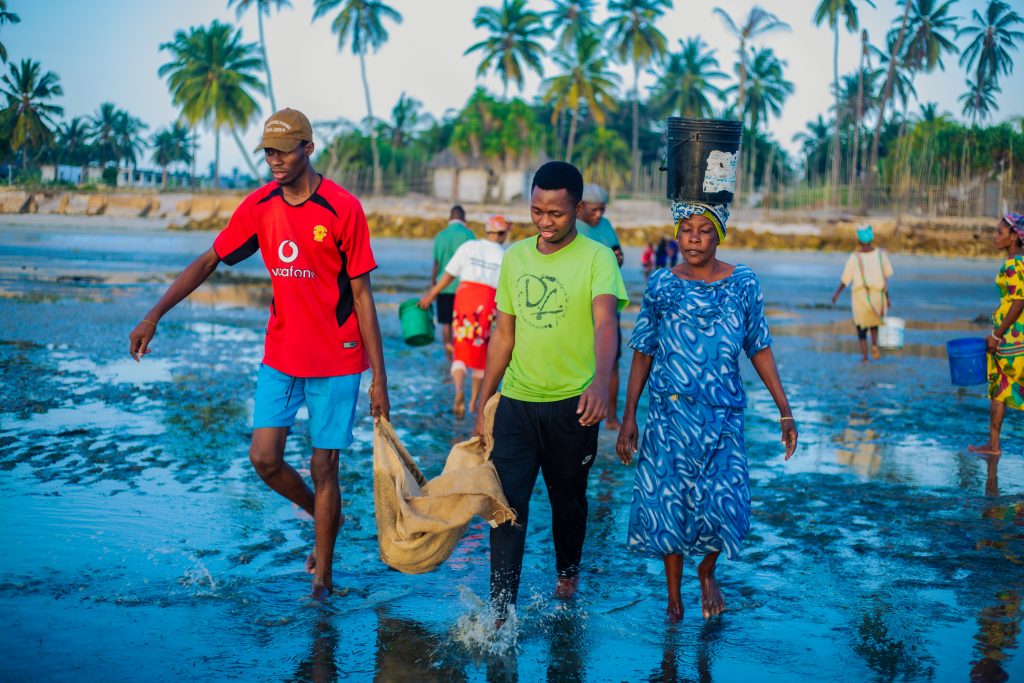
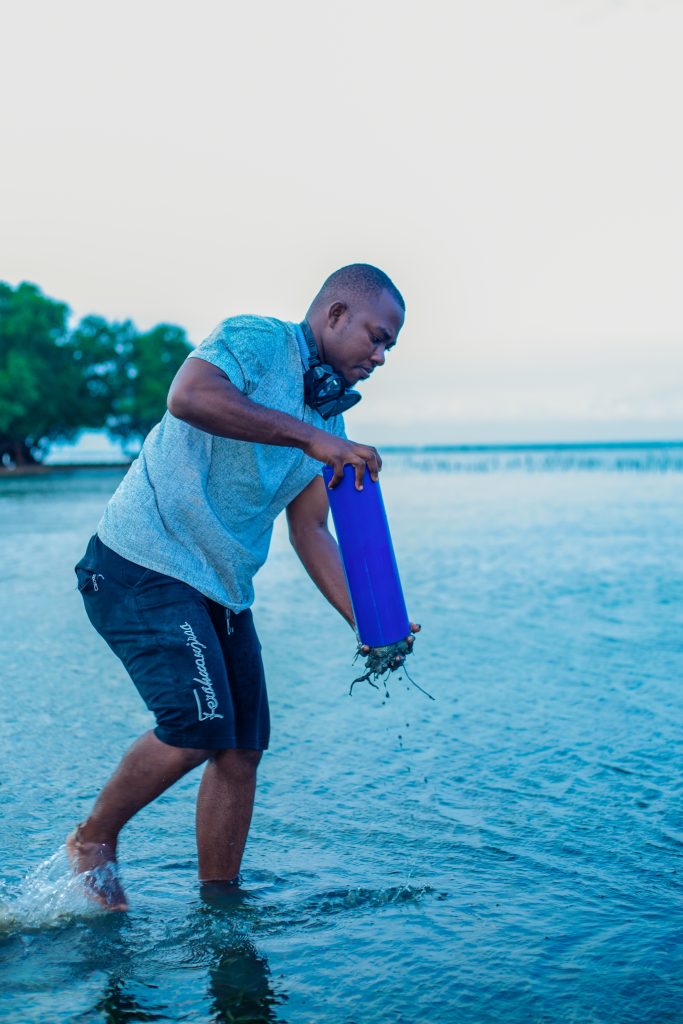
Yussuf Rukio is a marine scientist by professional, blue economy project officer and co-founder at SOA Tanzania, he is an excellent ocean leader leadng projects at SOA Tanzania
Livinus Renatus he is a marine scientist by professional with Bsc in Aquatic science and aquaculture from the university of Dodoma,Tanzania currently pursuing his MSc studies at the university of Dar es salaam, he is the Chief project officer and cofounder at SOA Tanzania with excellent leadership skills and project managements, he is passionate about ocean conservation and empowerment.
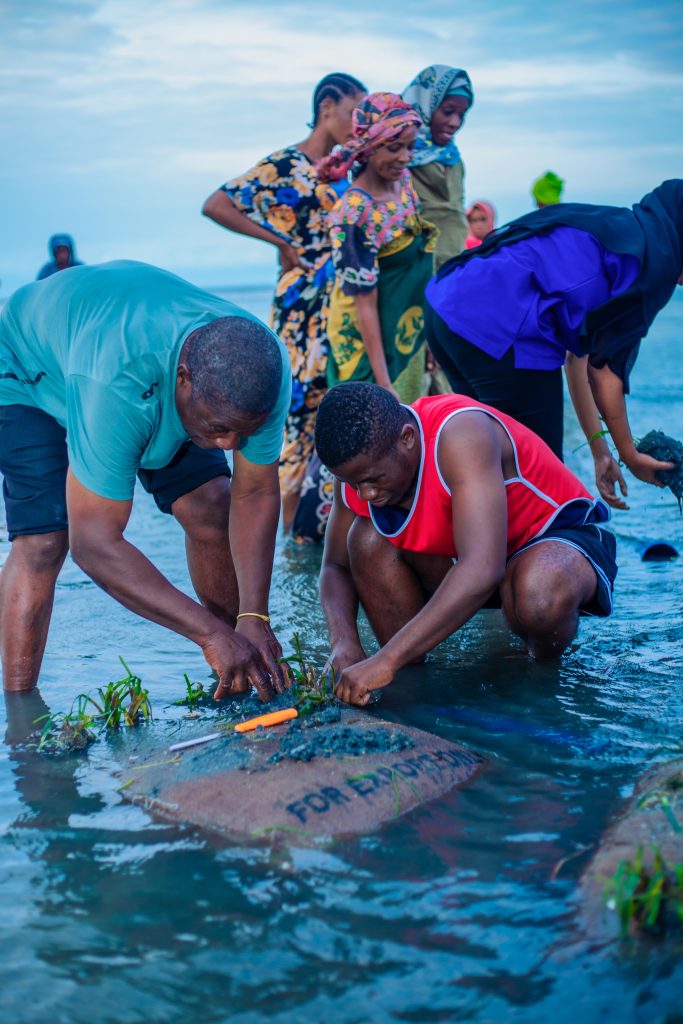
Qn2: what inspires you to work for our ocean.
“To work for the ocean is to honor the planet’s heartbeat, a call to protect the fragile ecosystems, creatures, and beauty that dwell beneath the surface. It’s an unwavering dedication forged by the awe-inspiring spectacles of nature and the understanding that our actions today shape the oceans of tomorrow. In this love, I find not only inspiration but also a responsibility. A commitment to safeguarding this irreplaceable treasure for all the generations yet to come.” Doreen Walter
“The benefits we get from the ocean directly and indirectly are the ones that inspire me to work for our ocean, so that ocean will continue to offer it’s benefits for the present and future generations.” Hadija Mussa
The OCEAN IS LIFE itself, until high school when I did not know better about the ocean and its potentials but I still saw it as something special,, we would go out to the beach and everybody is smiling, that was a great feeling and that only without deep understanding about the ocean directed me into my career path (marine sciences). Now that I am a marine scientist I have come to know better about the ocean and still stand by my belief that OCEAN IS LIFE and this keeps inspiring me to work for our oceans health for it to keep supporting life in our home planet Earth for the present and the many generations to come.
Shadya Ngirini
Ocean covers 70% of the earth’s surface and it consists of many interesting biological features which includes plants such as seagrasses, mangroves and seaweeds also animals like fish, sea cucumbers , sea urchins, dugongs and many others which are ecologically dependent to each others also we human beings are highly dependent on the ocean resources for our livelihood this is what inspires me the most and what drives me towards the sustainability and conservation of our ocean.
Nasra Nurudin
“Adventure and Working for change inspired and made Mr.Amrani working on restoring and protecting the ocean and other aquatic ecosystems,moreover the inspiration came from school projects and fields working on aquatic environments. When he discovered that swimming, aquatic animals like fishes and dugong dugong, are among his passions and favorite animals,Finally he decided to engage in marine ecosystem conservation against negative impact that impacts the ocean and it’s ecosystems.” Amrani Nurudin
“As a young marine scientist and ocean activist, working in the ocean inspires me in some common ways like: 1. Environmental Stewardship: Concern for the impact of human activities on the ocean motivates individuals to work towards sustainable solutions and to mitigate the threats faced by marine ecosystems and species. 2. Conservation of Biodiversity: The ocean hosts an immense variety of species, many of which are still undiscovered. Protecting this biodiversity and ensuring the survival of unique marine ecosystems is a powerful motivator for conservationists and environmentalists. 3. Awareness of Climate Change: Recognizing that the ocean plays a crucial role in regulating the Earth’s climate, many individuals are motivated to work on solutions to combat climate change. They seek to reduce carbon emissions, mitigate ocean acidification, and protect vulnerable habitats and species. 4. Conservation Education and Outreach: Inspiring the next generation to care for the ocean is a common motivation. People working in these fields often strive to educate others about the importance of the ocean and encourage sustainable practices to ensure a healthy future for our seas.” Paul Matonya
“When I look to the ferocious creatures that live within the ocean, vastness and unknown that lies beneath ocean surface, most of them they are not in a healthy conditions so we need to resiling them because they play vital role in aquatic life, in this decade society must go further to rally the world to protect it’s ocean. We can’t rely on the ocean community alone, we need to connect the ocean to people, we need to connect experts with the community. This makes me stay connected with the community to protect our ocean.” Renatus Shingi
Qn3: how has your participation in the seagrass restoration project in Bagamoyo helped you become an experienced ocean leader?
“I feel so proud to with my organization on it!. I learnt the good time to work in seagrass restoration because the low and high tides interrupt the working time. I got new skills based on skills, tools and the applied techniques to restore the seagrass. I got connected with each other from the Ocean Leader team up to community involvement. Was amazing.” Madereke John
“My participation enlightened me on the complexity of marine ecosystem and how important is it for us,ocean leaders to protect and nourish our ocean since they play a major role in sustaining the earth which is our home” Doreen Walter
“It helped me to know a lot about sea grass restoration, how to do it and everything about it that I was not aware of them before, but the most important thing that I learned there is how to involved the local community in the projects” Hadija Mussa
There is a lot to learn about the ocean, from its biology, chemistry, physics and geography and each of these has a lot to learn. I have learned a lot concerning marine ecosystems including the seagrasses and their conservation but I never got a chance to put my theoretical knowledge into action in the real world until the ‘‘SEAGRASS UNDERWATER PROJECT’’ in Bagamoyo. So as an ocean leader, my participation in this project has made it possible for me to synchronize my knowledge from the books and its reality which has helped me a great deal to polish myself into becoming an even more experienced ocean leader.
Shadya Ngirini
“I have studied seagrass theoretically. Working in the seagrass project in Bagamoyo helped me to be more familiar with seagrass species and also helped me to know how easily we can conserve the important ocean habitat (seagrass) for the maintenance of ocean health and sustainability.” Nasra Nurudin
“Seagrasses are important marine ecosystems situated throughout the world’s coastlines. They are facing declines around the world due to global and local threats such as rising ocean temperatures, coastal development and pollution from sewage outfalls and agriculture.I learned that Seagrass restoration is a rapidly maturing discipline, but improved restoration practices are needed to enhance the success of future restoration program in Bagamoyo, Tanzania.” Amrani Nurudin
This field has been very important to me, apart from getting experience but interacting with new other young ocean leaders as well as the coastal community has been more awesome, since as a leader and as an ocean activist has taught me that Seagrass restoration was not just about restoration, it was more than that. Interacting with people having different mentality and perspectives is quite a job which needs someone to have a well-balanced life skill. Just imagine working with people with different personalities and being able to go with and achieve a goal. Therefore, for me this project was not only about getting experience on Seagrass restoration but also developing an important life skill to work with different people and being to consider their perspectives, age and personalities.
Paul Matonya
“Apart from studying seagrass restoration in the class but I never did it practically so I was like woow this project is amazing! because I leant a lot of things like restoration of seagrass it self, working together with community and other members of the group that I have never work with them before without considering their Age, Sex or personality.” Renatus Shingi
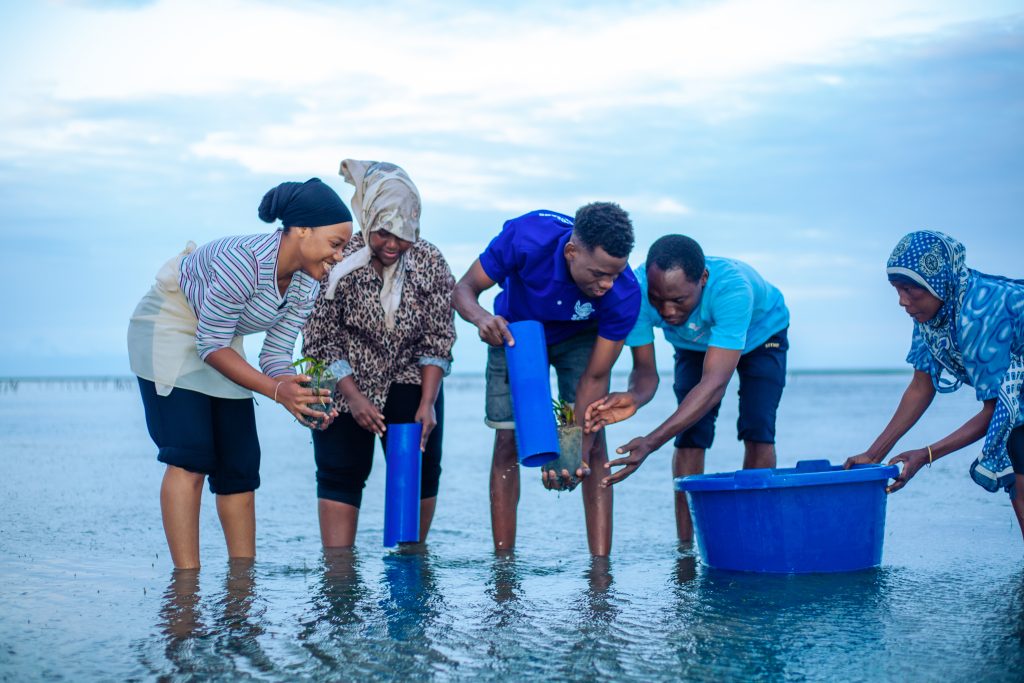
Qn4: what are your key takeaways or what have you learned from the seagrass project?
“I learnt that during restoration, you must identify the type of species degraded and the species which it can be favored for restoration. The soil type can influence the growing rate of the restored species. Community engagement increases the security rate to the whole process.” Madereke John
“The complexity of the seagrass: 1.I learned that seagrass ecosystem are complex and delicate and this impose the need to conserve and protect. 2.The importance of seagrass ecosystem to the fishery industry and coastal community. 3.The need to involve coastal community in conservation projects and provision of education to the coastal community on the importance of marine ecosystem in the sustainability of the ocean and fishery industry” Doreen Walter
“From my participation in the seagrass project I have learnt a lot. One of the key lessons I got is that, the conservation of these ecosystems is not the responsibility of ocean leaders alone or the local coastal communities that reside around the oceans but rather it is the responsibility of everybody as we all benefit from them, be it directly or indirectly. Another important lesson that I got is that these local coastal communities are always ready to participate, we just need to reach out to them, build their capacity and the rest is history. I also got to learn the methods and procedures of seagrass restoration.” Shadya Ngirini
“I have learnt that the conservation of ocean ecosystems is the responsibility of everyone, not only the coastal communities. Also a lot of efforts are needed to raise awareness of the protection of important ecosystems like seagrass thus the health of the ocean will be improved.” Nasra Nurudin
“Teamwork, awareness on Ocean ecosystem conservation, Capacity building to the coastal communities and other ocean resource users and improved seagrass restoration practice are needed to enhance Successful seagrass restoration in Bagamoyo, Tanzania.” Amrani Nurudin
“I have learnt that restorational projects are not about restorations only but also having a life skill and developing it to be able to work with them in a good relationship.” Paul Matonya
Qn5: In one word describe your new experience you got from this seagrass restoration project
- Cooperation
- Motivation
- Educative
- Commitment
- Amaizing
- Flexibility
- Responsibility
Qn6: What is your message to other youth and how can young people in Tanzania be empowered in ocean conservation and the blue economy?
“Blue economy and Fish sustainability depends on human fairness. All Youth we are responsible to Educate, Conserve and protect all marine resources for sustainable utility. Young people can be empowered by; Giving them modern ways of fishing to regulate the species population. Providing conservation education to the community . To establish and support other economic activities such as business to reduce too much dependence from the ocean.” Madereke John
To the youth of Tanzania and beyond, I urge you to embrace your role as stewards of the ocean and champions of the blue economy. The ocean holds immense potential for sustainable livelihoods, innovative solutions, and ecological balance. Empowerment begins with education; seek knowledge about marine ecosystems, conservation, and the opportunities within the blue economy. Collaborate with local communities, governments, and NGOs to drive change, advocate for sustainable fishing practices, and combat plastic pollution. By uniting your passion with action, you can be a driving force in safeguarding Tanzania’s coastal treasures, promoting responsible ocean resource management, and securing a vibrant and sustainable future for yourselves and generations to come.
Doreen Walter
“I want to tell them that conserving the ocean is one of the most joyful activities in the world because by doing so you are saving people in your community and world as whole; I can’t explain that feeling. But it’s the most beautiful thing to ever happen in my life and now am addicted to the issue of ocean and environmental conservation. Young people in Tanzania can be empowered by giving them education about ocean conservation and blue economy, giving them funds so that they can be able to do value economy to earn income.” Hadija Mussa
Dear fellow young people of Tanzania,
Our oceans are not just vast bodies of water; they are the lifeblood of our planet. As the next generation of leaders, we hold the responsibility of protecting and nurturing this invaluable resource. Here is my message to you;
‘‘Recognize the power of knowledge as the foundation for ocean conservation and promoting the blue economy. Share this awareness widely, encouraging local engagement through initiatives, clean-up projects, and community efforts, inspiring others to join. Emphasize the potential of the ‘blue economy’ for sustainable development while advocating for a balance with marine ecosystem preservation. Utilize creative mediums, such as social media, art, and storytelling, to raise awareness about ocean conservation and inspire action.’’
Remember, our actions today will determine the state of the oceans for our children and grandchildren. Let’s work together to safeguard this irreplaceable resource and create a sustainable and prosperous future for Tanzania. We have the power to make a difference; let’s use it wisely.
Shadya Ngirini
“My message is that as youth we are highly needed in ocean conservation since we are the new change of the new coming generation so let together come up and protect our ocean for us and the coming generations. Many young people in Tanzania are ready for the ocean conservation but the biggest problem is that the conservation activities need funds and most of youth in Tanzania are unemployed these results to the failure of the ocean conservation hence we as youth in Tanzania we need funds so that we can show to the world how we are highly committed to the ocean conservation.” Nasra Nurudin
“Our planet is our home, the place that sustains us; but are we living in harmony with nature? It seems like we humans have embraced a path of self-destruction, destroying the very home that shelters us. From rising carbon emissions, to deforestation and land degradation, anthropogenic activities are having detrimental effects on our ecosystems and environmental biodiversity. Not many are aware that We are in the final period of this crucial decade, and despite several strategic plans and initiatives to mobilize people at different levels, we are miles behind in achieving the stipulated targets. The negative trends in biodiversity and ecosystems conservation, indicate that we need to do a lot more. Youth can be empowered in Ocean ecosystem conservation; There are several ways in which youth can get involved, from running online awareness campaigns, to offering practical help like beach clean-ups, and fundraising events.” Amrani Nurudin
To my fellow youths. I want to tell you that we are the game changers in ocean conservation and the blue economy since were energetic we got all the powers to make the earth a beautiful place for generations and generations, therefore its everyone’s responsibility to unleash his/her potential towards saving the earth and the life it supports through ocean conservation and Blue economy.
Paul Matonya
“Tanzania It’s known with the problem of employment so I think young people (youth) should start forming groups and starting restoring oceanic resources, then there are different people and Organizations from inside the country even outside the country they want to fund these projects. Through restoration of oceanic resources youth may get employment and protectng our ocean at the same time. That is the true meaning of the Blue economy.” Renatus Shingi
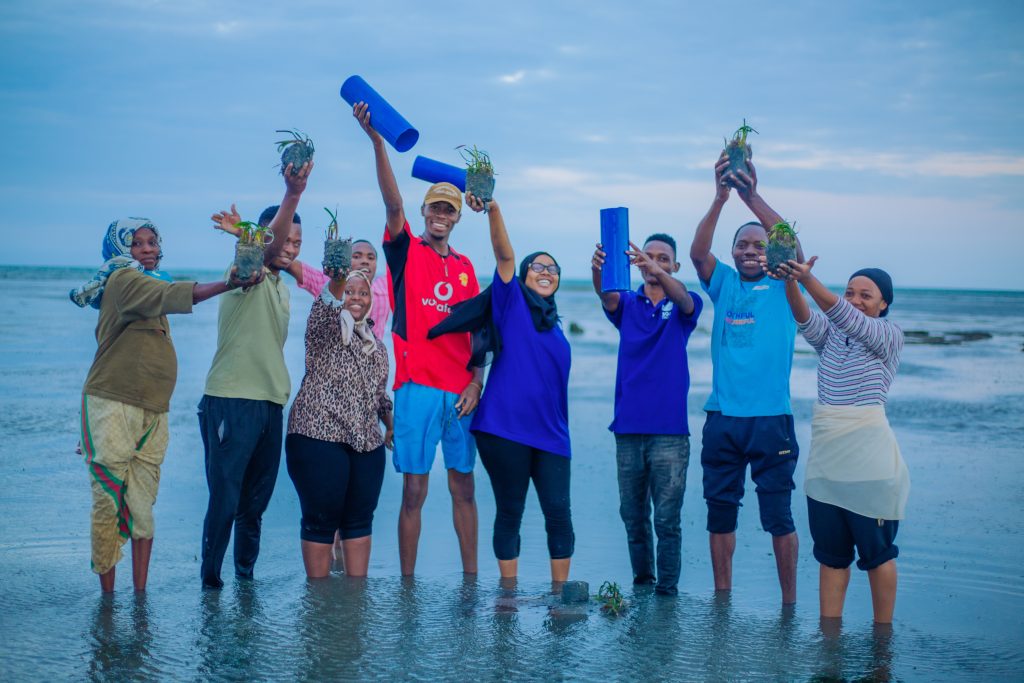
Qn7: what is your message to the world about seagrass restoration and ocean restoration in general
Seagrass, often overlooked but essential, is a lifeline for our planet’s health. These underwater meadows not only provide critical habitats for countless marine species but also act as a powerful ally in combating climate change by sequestering carbon at rates much higher than many terrestrial forests. Furthermore, seagrass beds purify our waters, stabilize coastal ecosystems, and offer coastal communities protection from erosion and storm surges. Yet, these vital ecosystems are under grave threat from pollution, coastal development, and climate change. It’s imperative that we recognize the significance of seagrass and take immediate action to protect and restore these underwater wonders. Our planet’s health and the well-being of future generations depend on our commitment to seagrass conservation.
Doreen Walter
“Seagrass are very important to marine life and in the regulation of carbon in the atmosphere, and as we know that ocean is the major sink of carbon, so we must protect seagrasses at all cost, we must do our best not to pollute them because we need them. We should act in time to restore and conserve our ocean. ” Hadija Mussa
As a young ocean leader, my message to the world about seagrass restoration and ocean restoration, in general, is one of urgency and hope. Ocean restoration efforts require global cooperation. We must work together across borders, sharing knowledge, resources, and best practices to ensure the success of restoration initiatives. During the global efforts to restore these vital ecosystems it is important to engage local communities in restoration efforts. Their knowledge and involvement are often crucial to the success and sustainability of these projects.Lastly, seagrass ecosystems are vital for the health of our oceans, and their restoration is a critical step towards a more sustainable and resilient future for our planet.
Shadya Ngirini
“The world ecosystems are highly destructed which leads to the disaster especially to the ocean biological species and also to us human beings, we don’t live in the ocean but ocean is like our mother home since ocean helps us to get the fresh air we breath, helps us to get plenty of food, helps us to get many sources of energy, helps us to get many other needs like refreshments. Who will protect all these if not us? Who will be blamed for the damage if not us. Let’s protect the ocean, lets restore the destroyed ecosystems like seagrass and at the end we will enjoy the ocean.” Nasra Nurudin
“Being a coastal community, Ocean resources user and understanding what life underwater means, we had to step up and restore the seagrasses because of their benefit to us, aquatic ecosystems and also to everyone else who depends on the ocean so lets children of our children to taste the same ocean resources by conserving and restoring seagrass for ecosystem to regenerate sustainably for future use.” Amrani Nurudin
Seagrasses are critical to the health of our oceans and play an essential role in maintaining the balance of our climate system. Seagrass restoration is a vital process for protecting marine biodiversity, reducing coastal erosion, and mitigating climate change. It is crucial to raise awareness about the importance of seagrass restoration and encourage individuals, businesses, and governments to take action to protect these critical ecosystems and ensure their long-term survival. By restoring seagrass habitats, we can help support the biodiversity of our oceans while also mitigating the impacts of climate change. Restoring seagrass meadows is an effective way to reduce carbon dioxide emissions, improve water quality, and protect valuable fish habitats. With the right support and resources, seagrass restoration can have a positive impact on the health of our oceans and our planet, now and for generations to come.
Paul Matonya
“seagrass is responsible for sequestering 11% of organic carbon buried in the ocean, act as a nursery ground, habitat to aquatic organisms and improves water quality. Restoring them means providing climate regulation and economic progress in the future.” Renatus Shingi

It’s amazing article
Amazing and inspiring
very nice
Nice article
Insipired👏
Obligado👏👏